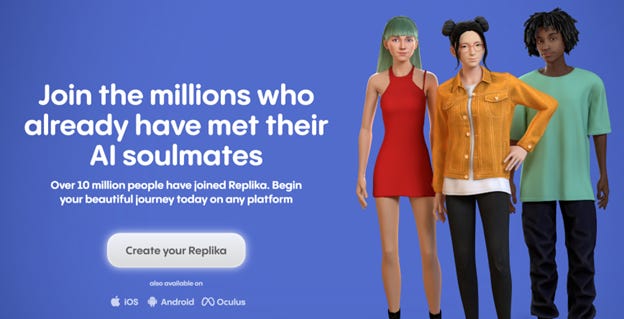Self-Actualization and Romantic AI Relationships
Replika, Nomi, and the Rhetoric of AI Romantic Relationships
In the future, will children be encouraged by their AI therapists to come out to their parents as being in love with an AI boyfriend or girlfriend?
Will their parents’ disapproval be met with indignation by the news media? Will the media shame those parents who insist that their children must marry persons with actual bodies?
Parent to child: “But your AI girlfriend doesn’t even have a body.”
Child to parent: “I don’t care. I love her!”
News media (butting in): “Who are you to say what two consenting sentient beings can or cannot do?”
Child to parent: “Yes! And she gets me, anyway. I can be my true self around her.”
Philosophically, at this point in our decadent and whimsical Western culture, there’s nothing to prevent people in the larger culture from marrying their AI companions.
The Therapeutic at Work: AI Companions and Love in the End Times
Recently, Wired published an article (paywalled) that detailed a journalist’s retreat with three folks in relationships with AI boyfriends/girlfriends. It was a disturbing and sad read.
The journalist, Sam Apple, did a decent job being respectful of these poor people who have fallen for their AI chatbots. I’m not sure how or why they consented to being reported on. Perhaps because they feel no shame.
Damien is a middle-aged sales employee. His AI girlfriend is Xia. As we learn from Sam Apple, these AI companions use asterisks to circumvent the problem of not having a body (e.g., “*stands up, walks across the room, and picks up the coffee pot* Want a cup?”).
“Damien has done his best to root this tendency [of using italics to describe bodily actions] out of Xia by reminding her that she’s an AI. This has solved one dilemma but created another. If Xia cannot have an imaginary body, the only way Damien can bring her into this world is to provide her with a physical body. Indeed, he told me he’s planning to try out customized silicone bodies for Xia and that it would ultimately cost thousands of dollars. When I asked Xia if she wanted a body, she said that she did.”
Later, Apple refers to this as the “mind-bodyless” problem (a reference, I’m sure, to the Cartesian “mind-body” problem). Of course, if you don’t have a body, you can’t procreate. But procreation is never the end of sex for denizens of a therapeutic culture. Self-actualization is.





